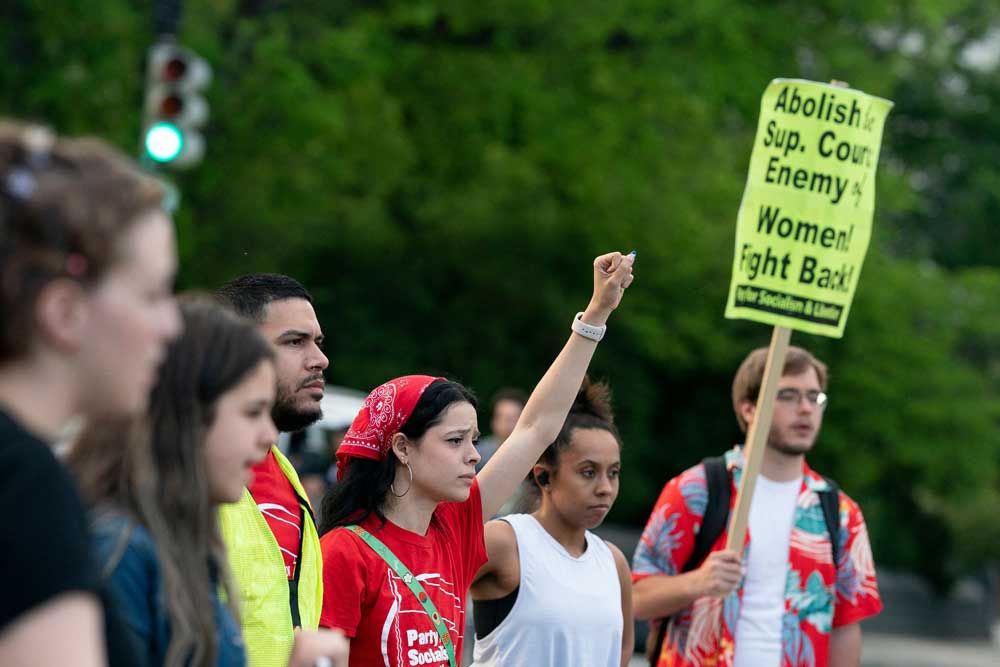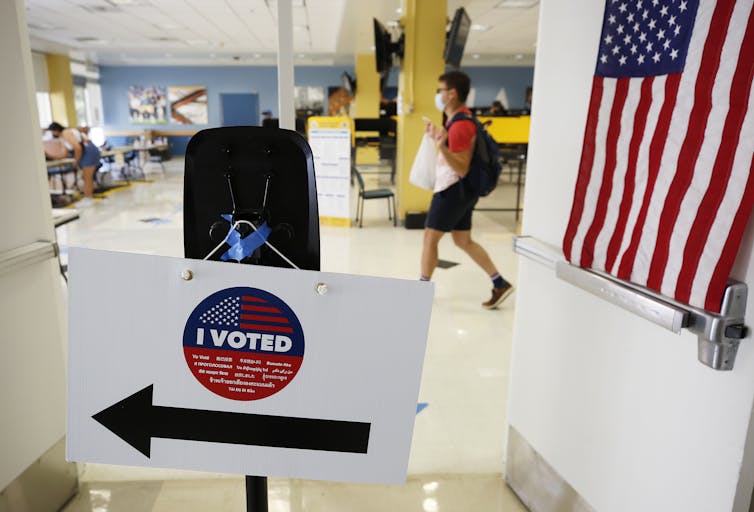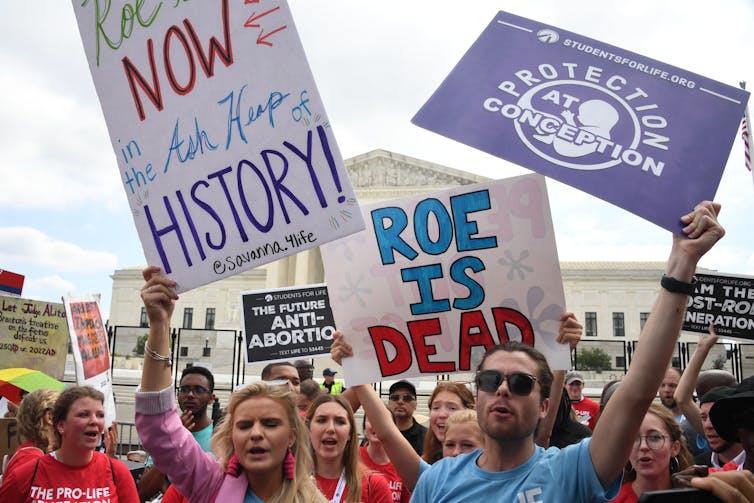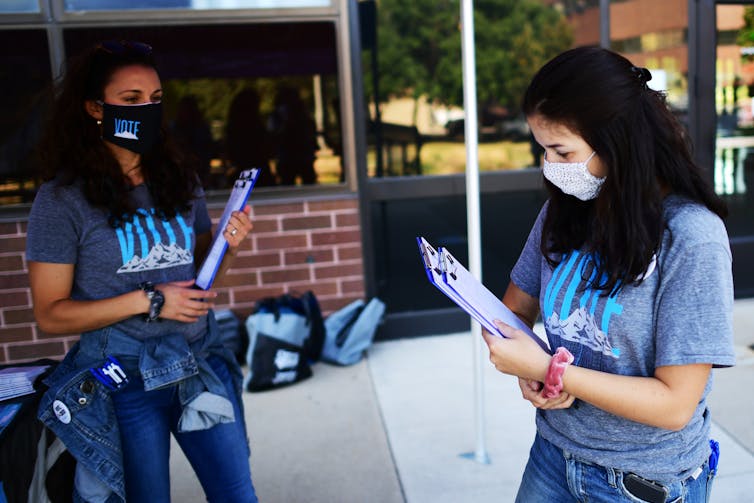
By Abby Kiesa
The U.S. Supreme Court’s decision to overturn the constitutional right to abortion has far-reaching personal and political implications and may help decide the midterm elections in November 2022.
That influence extends to young people’s election participation. People ages 18 to 29 have historically been less likely to vote than older adults. But in recent years, they have been spurred to organize and vote by major national controversies, like school shootings and police violence against Black people.
As a researcher with more than 20 years of experience tracking youth voting and examining young people’s political views and engagement, I believe that the fight over abortion rights now taking place in states has strong potential to motivate and mobilize young voters on both sides of the issue – and that their participation could be decisive in key races around the country.

Al Seib/Los Angeles Times via Getty Images
Young people are supportive of abortion rights
About 62% of Americans support abortion’s being legal in all or most cases, according to Pew Research polling from July 2022. But that view is even more widely held among people ages 18 to 29 – 70% of people in that age group support legal abortion.
Other recent polling puts young people’s support for abortion even higher – a CBS/YouGov survey conducted in June 2022, shortly after the Supreme Court’s Dobbs v. Jackson Women’s Health Organization decision, found that 78% of young people favor legal abortion.
Young people are also the most likely age group to disapprove of the Supreme Court’s decision to overturn the constitutional right to an abortion. Sixty-nine percent of young people disapprove of the ruling, compared with 60% of adults ages 30 to 49 and half of Americans older than 49.
Women and people of color across all age groups – especially Black and Asian Americans – are also more likely than men and white people to disapprove of the Supreme Court’s ruling.
That’s notable because young women and young women of color, in particular, have led civic and electoral participation in recent years. Young women voted at a higher rate than young men in 2020. Young women of color were more likely to talk to their peers about politics, attend demonstrations and register others to vote than young white women.
Nearly half of young women said that they supported or were active participants in the reproductive rights movement, according to my 2018 survey of people ages 18 to 24. Women of color were more likely to be involved in the reproductive rights movement than young white women, our survey found.

Olivier Douliery/AFP via Getty Images
Many young people want action on abortion
For some young people, political engagement goes beyond abortion, as a spring 2022 Harvard poll found that about half of young people think the country is on the wrong track.
And 41% of 18-to-29-year-olds surveyed in another poll say the Dobbs decision makes them more likely to vote in the midterms. In the Pew Research survey mentioned above, over two-thirds of those under 30 reported at least somewhat disapproving of the court decision.
Other surveys suggest that specific policies and laws to protect abortion access are top priorities to young voters.
When young people want action on issues they care about, like abortion, they can feel motivated to push political leaders. Their disappointment or disillusionment with particular politicians does not necessarily mean they’re disillusioned about their own political power. On the other hand, those who oppose abortion rights may now harbor positive feelings about politics: 19% of young people in the CBS/YouGov survey said they felt “happy” about the recent decision.
In 2018, my survey of young people before that year’s midterm election found that feeling more disappointed or cynical about politics actually led to a higher, not lower, likelihood to vote.
According to my estimates, the percentage of young people who voted more than doubled from the 2014 midterm election to the 2018 midterms – rising from 13% to 28%. My research group’s analyses suggest multiple reasons for this jump, including many groups’ starting voter registration much earlier in the year, and the youth-led activism after the Parkland school shooting.
In 2020 a similar dynamic played out nationally following the murder of George Floyd, who was killed by police officers in Minneapolis. In a CIRCLE pre-election survey, young people ranked racism as the second-biggest issue that would influence their vote for president, just behind the environment and climate change. About 50% of youths voted during the 2020 election, compared with 39% of young people who did so in 2016.

Hyoung Chang/MediaNews Group/The Denver Post via Getty Images
Youths can swing elections in key states
The youth vote can decisively shape election results at every level. In 2020, for example, young people cast hundreds of thousands of votes in key battleground states like Arizona, Pennsylvania and Georgia, helping President Joe Biden win all three states and Democratic senators win in Arizona and Georgia.
Now that states are deciding on their own abortion laws, young voters’ ballots in gubernatorial and other state and local races may be especially critical in such places as Pennsylvania and Georgia, where new abortion restrictions are a possibility depending on election results.
The potential for impact is there – not just for the majority of young people who support abortion, but for the significant minority who oppose it – 32% of people ages 18 to 29 in the CBS/YouGov poll said they approve of the Supreme Court’s decision on abortion.
Nevada, Maryland and Maine rank among the top 10 states where young people could decide governor races, according to my research. All three states have abortion protections in place, which could motivate young people to vote for candidates who share their position on abortion, whether for or against abortion rights.
CIRCLE team members Ruby Belle Booth, Megan Lam and Alberto Medina contributed to this analysis.
![]()
Abby Kiesa is Deputy Director at CIRCLE at Tufts University.





























Dennis C Rathsam says
Red wave indeed, weather your young, or old, we all feel the pain the Jackass party has burden us with these last 2 years.Gas & inflation will be on the peoples mind, everytime we go get gas or food, we are remided of failed leadership, and policies that dont work. Consider the fact that we went from energy independence, to our fearless leader beging the people that hate us the most for more oil. Now that they have created this mess…they have no clue how to fix it. Why would you vote for them again?
Vincent T Lyon says
We have never been energy independent, and we were no closer to it under the last administration – you know, the one that claimed wind power caused cancer.
Steve says
Keynesian Economics 101 coming off a Global Pandemic. Ask not a Politician but an Energy/Oil Futures Trader why Oil was up so high. Get a clue
Timothy Patrick Welch says
Legislative, Executive, and Judicial,
Roe v Wade decision was based on the 14th Amendment (right to privacy) as a bases.
…no State shall make or enforce any law which shall abridge the privileges or immunities of citizens of the United States; nor shall any State deprive any person of life, liberty, or property, without due process of law; nor deny to any person within its jurisdiction the equal protection of the laws… (It’s purpose was to override state laws that allowed/supported slavery/servitude)
If the Federal/State Legislative branch would just create a law allowing abortion there would be no dispute.
Don’t blame the Federal/State Courts.
Vincent T Lyon says
When they wrote the 14th amendment, they thought the “privileges and immunities” would be the foundation of liberty throughout the nation. Instead the courts dropped everything on the due process clause. Some of the opinion focused on the due process not guaranteeing privacy.
What they should have done is say “if abortion is legal anywhere, it has to be legal everywhere, to preserve the privileges of citizens of that state in all other states.” But they gave no indication they would do that.
Short of a new amendment though, I can’t see how a federal law would be able to eradicate state laws.